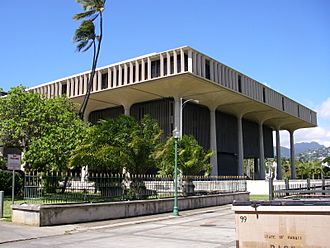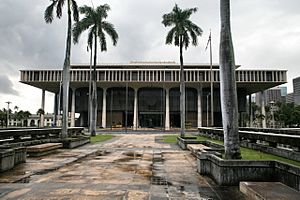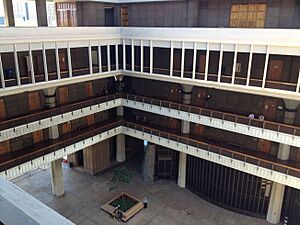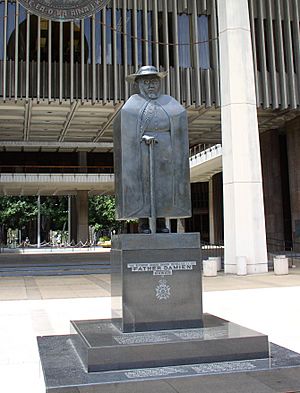Hawaii State Capitol facts for kids
Quick facts for kids Hawaii State Capitol |
|
|---|---|

The Hawaii State Capitol from the southeast
|
|
| General information | |
| Architectural style | Hawaiian international architecture |
| Location | 415 S. Beretania Street Honolulu, Hawaii |
| Coordinates | 21°18′27″N 157°51′27″W / 21.30750°N 157.85750°W |
| Construction started | November 10, 1965 |
| Completed | March 15, 1969 |
| Client | State of Hawaii |
| Owner | State of Hawaii |
| Design and construction | |
| Architect | Belt, Lemmon & Lo and John Carl Warnecke & Associates |
|
Hawaii State Capitol & Grounds
|
|
|
U.S. Historic district
Contributing property |
|
| Part of | Hawaii Capital Historic District (ID78001020) |
| Designated CP | 12/01/1978 |
The Hawaii State Capitol is the main building where Hawaii's government works. It's like the state's headquarters! Here, important leaders and lawmakers make decisions for everyone in Hawaii.
The Hawaii State Legislature meets here. This group includes the Hawaii State Senate (25 members) and the Hawaii State House of Representatives (51 members). They work together to create laws. The Governor of Hawaii and Lieutenant Governor of Hawaii also have their offices in this building.
The Hawaii State Capitol is located in downtown Honolulu. It was officially opened on March 15, 1969, by John A. Burns, who was the second Governor of Hawaii. Before this building, the government used the beautiful ʻIolani Palace as its statehouse.
Contents
Special Monuments and Statues
The area around the Hawaii State Capitol has several important monuments. These statues and memorials help us remember key people and events in Hawaii's history.
Queen Liliʻuokalani Statue
Between the Capitol building and ʻIolani Palace, you'll find the Queen Liliʻuokalani Statue. This statue honors Queen Liliʻuokalani, Hawaii's last reigning monarch. It was dedicated on April 10, 1982. The land where the Capitol stands was once a royal home called Haimoeipo. It belonged to Queen Dowager Kalama and later to King Lunalilo.
Liberty Bell
Near the Beretania Street entrance, there is a special bell called the Liberty Bell. This bell was a gift from the President of the United States and the United States Congress in 1950. It was given to Hawaii as a symbol of freedom and democracy.
Father Damien Statue
One of the most famous statues on the grounds is the Father Damien Statue. This statue honors a Roman Catholic priest named Father Damien. He bravely helped people suffering from leprosy for sixteen years. Father Damien passed away in 1869. He was later recognized as a saint by the Catholic Church.
Eternal Flame
Also on Beretania Street, you can see the Eternal Flame. This is a metal torch that burns all the time. It is a tribute to all the brave men and women from Hawaii who have served in the Air Force, Army, Coast Guard, Marines, and Navy. It honors their service in different conflicts where the United States was involved.
Korean-Vietnam War Memorial
The Korean-Vietnam War Memorial remembers service members who died in those wars. It was dedicated on July 24, 1994, by Benjamin J. Cayetano, who was the fifth Governor of Hawaii. The monument has 768 black marble pedestals. These pedestals are engraved with the names of 312 service members from the Vietnam War. A larger marble slab has a special message of remembrance in the Hawaiian language.
Unique Architecture and Design
The Hawaii State Capitol has a very special design. It's different from many other state capitols in the U.S. that look like the United States Capitol in Washington D.C. This building's design uses features that symbolize Hawaii's natural beauty.
Here are some cool facts about its architecture:
- The building is surrounded by a reflecting pool. This pool represents the huge Pacific Ocean that surrounds the islands.
- The two main rooms where lawmakers meet are shaped like cones. These shapes remind us of the volcanoes that created the Hawaiian Islands.
- The columns around the outside of the building look like royal palm trees. There are eight columns on each side, representing the eight main islands of Hawaii. You'll find groups of eight items in other parts of the building too.
- The Capitol has an open-air design. This means sun, wind, and even rain can come inside! The central area opens up to the sky. Sometimes, when it rains, you can even see rainbows inside the building.
- Four kukui nut trees, which are Hawaii's state tree, are planted on the grounds. The number four represents the four main counties in Hawaii and the four major Hawaiian gods. You'll see groups of four items in many other places in the building.
- If you stand in the middle of the building, you can see the chandeliers from both legislative rooms through glass walls. These chandeliers represent the sun and moon. Unlike most capitol buildings that have a dome, the Hawaii State Capitol has an open roof. People say the sky itself is Hawaii's capitol dome!
- The chandeliers were designed by artist Otto Piene. The "Sun" chandelier in the House of Representatives is made of many gold-plated globes. The "Moon" chandelier in the Senate is made of 620 white chambered nautilus shells.
Reflecting Pool Challenges
Since the Capitol was finished in 1969, the reflecting pool has had a problem with algae growing in it. This is partly because the pool uses slightly salty water from wells. To try and fix this, the state has put tilapia fish into the pool and installed a special water treatment system. Workers also clean the pool by hand and add special enzymes to the water. Some people joke that the algae now represents pollution in the Pacific Ocean, which is the opposite of what the pool was meant to symbolize!
Images for kids
-
Hawaii State Capitol view photographed from the rim of Punchbowl Crater
See also
 In Spanish: Capitolio de Hawái para niños
In Spanish: Capitolio de Hawái para niños
 | Jessica Watkins |
 | Robert Henry Lawrence Jr. |
 | Mae Jemison |
 | Sian Proctor |
 | Guion Bluford |






